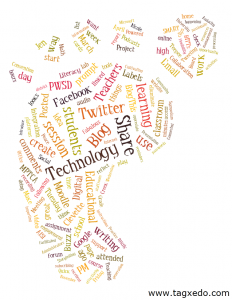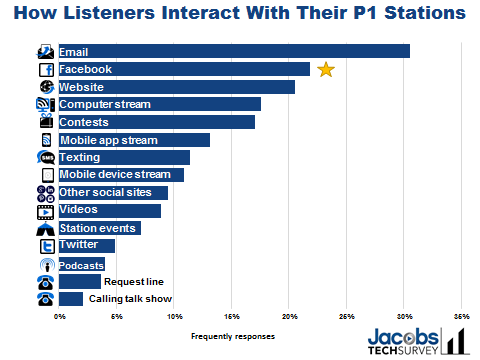Some of us (hey, don’t look at ME!) might be guilty of being so committed to our careers and our craft that we simply never make much time to pursue other interests. There’s golf, gardening, scrapbooking, wine collecting, art, tennis, and endless other entertaining ways of expanding ourselves and spending free time.
All the signs point to the notion that having diversions and hobbies can be a healthy thing for many people. This is especially true for those of you thinking you’re now working in your last job, and looking a bit more down the road.
But while having a hobby can be an enriching part of our personal lives, it isn’t a great strategy in business. Projects and initiatives that have hobby status don’t have our full attention or focus. We get to them when we can – usually after more important tasks are completed.
Sadly, that’s how many stations, programmers, and personalities have treated social media during the past several years. While pretty much everyone has a page on Facebook and other social platforms, very few have truly studied their activity, their posts, their metrics, and fan reaction and response.
It’s ironic, because when it comes to programming, there is no shortage of tools and analytics. Nielsen (and Arbitron before it) offers great analytical tools. There’s Media Monitors, along with outside companies that slice and dice the ratings so we can better understand the result of our programming and promotion activity. Music testing, perceptual research, and other services provide even more data and information so that programmers can make the wisest decisions. Overall, a lot of money and a lot of time are spent on deciphering and analyzing ratings.
And yet, when it comes to social media activity, many radio people would rather fly blind, throwing out posts, memes, photos, and videos – with little thought about whether they’re working, resonating, or causing more harm than good.
Lori Lewis believes that because social is “free,” many simply don’t take it that seriously, treating it more as a hobby than a strategic tool for connecting with fans. And consequently, social assets that have the potential to reach and engage even more people than towers and transmitters are under-estimated and minimized by stations in markets big and small.
That’s not the case in the global world of business, where the biggest and best brands go to school on social, staff up, and hack their way to success. They realize that platforms like Facebook, Twitter, Instagram, Pinterest, and now Snapchat provide a unique and highly personal pathway to their fans. Learning how to listen to them, participate in their conversations, and provide them with those “holy crap!” moments is what success in social media looks like.
In the radio space, we have traditionally devoted a question in Techsurvey11 to quantify the ways in which fans frequently interact with their favorite radio stations. We provide the list, and ask them which touch points are the ones they use the most to interact with their preferred radio brands. Here’s the latest result:
Our Techssurveys are mostly comprised of members of station email databases. So it’s not a surprise that email is the top engagement tool for our more than 41,600 respondents. But Facebook is a solid #2, a compelling finding that underscores the role of social media in a radio station’s audience service strategy. If that many people are interacting with you on social sites, shouldn’t there be a quest to try and get it right?
The other amazing feature of TS11 is its ability to help stations understand the preferred social platforms of their listeners. So often, programmers and marketers wonder about the optimal social channels that impact their audiences. Through research, it’s a simple task to learn about specific social priorities – and then act and budget accordingly. Establishing a station’s social media footprint is the way managers can start this journey.
 This is becoming more critical to radio’s ability to connect socially because the big players like Facebook and Twitter are tweaking the rules, making it more difficult to easily reach their users. Becoming more conversant with the social space is now part of the job of building a great brand. Whether you hire people who are skilled in this area or look to consultants like Lori for advice, there’s no question that social media should be elevated on the priority lists of commercial and public radio stations.
This is becoming more critical to radio’s ability to connect socially because the big players like Facebook and Twitter are tweaking the rules, making it more difficult to easily reach their users. Becoming more conversant with the social space is now part of the job of building a great brand. Whether you hire people who are skilled in this area or look to consultants like Lori for advice, there’s no question that social media should be elevated on the priority lists of commercial and public radio stations.
As broadcasters continue to share space and time with pure-plays, satellite radio, podcasts, and other digital audio sources, the ability to connect socially with audiences will become an even more important advantage – if stations take the time and make the effort to improve their skill sets.
Radio has the advantage of being local – or as the BBC’s Ben Cooper put it last week at the Worldwide Radio Summit – “community.” That doesn’t necessarily mean the geographic confines of your metro area, but the groups and tribes that share the same sensibilities and tastes – whether it’s the Cubs, Led Zeppelin, Thai restaurants, or zombie movies. And sites like Facebook are where these communities come together.
Social media is an amazing tool that broadcasters can use to make that sense of “community” come to life. But not by executing random acts of social. Marketers that represent brands like Coca-Cola, Taco Bell, Southwest Airlines, and Denny’s will tell you that it’s more complicated than you think, which is why they continue to pour money, resources, and brain power toward becoming proficient at social brand building. For them, social media isn’t just a pastime – it’s a priority.
Pursue your hobbies during your off time.
Get serious about social media now.
- What To Do If Your Radio Station Goes Through A Midlife Crisis - April 25, 2025
- A 2020 Lesson?It Could All Be Gone In A Flash - April 24, 2025
- How AI Can Give Radio Personalities More…PERSONALITY - April 23, 2025





If you don’t know what to think about something… Ask your woman. She definitely will tell you. My girlfriend is a specialist of social media marketing. I’ve asked her about my radio’s Facebook profile.
Next day, she gave me a long list of disadvantages and short list of advantages. It makes no sense to talk about all of them…
However, I must tell you about one thing… Because, perhaps it is the most unique matter in the world. One radio has two fanpages on Facebook. We have Polish Radio Bialystok’s fanpage, and also The Music Page Of Polish Radio Bialystok. My girlfriend proved me, why it is a bad idea… She wrote:
– The radio is music, so why would you have another fanpage
– The lack of a coherent image
– The lack of synchronization between that both fan pages
– Why aren’t you analysing your fans? It is very important! If you are not analysing your fans, You can delete your profiles. (I told her that we do not know what kind of people like our profiles)
The moral is… If you want to do something professionally, leave it to professionals … Or ask your woman. The best is when your women is an professional.
Lesson learned. Thanks for chiming in Pawel.